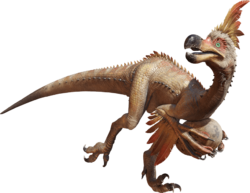Kulu-Ya-Ku: Difference between revisions
mNo edit summary |
(Added title from Monster Hunter World: The Official Complete Works) |
||
| Line 2: | Line 2: | ||
|English Name= Kulu-Ya-Ku | |English Name= Kulu-Ya-Ku | ||
|Image= 20th-Kulu-Ya-Ku Render.png | |Image= 20th-Kulu-Ya-Ku Render.png | ||
|Title= Feathered Plunderer | |||
|Japanese Name= クルルヤック | |Japanese Name= クルルヤック | ||
|Introduced= MHW | |Introduced= MHW | ||
Revision as of 21:54, 25 May 2024
| Kulu-Ya-Ku クルルヤック | ||
|---|---|---|
 | ||
| Title | Feathered Plunderer | |
| Introduced | MHW | |
| Classification | Bird Wyvern | |
| Element | Unknown | |
| Average Dimensions | ||
| Length | Unknown | |
| Height | Unknown | |
| Foot Size | Unknown | |
| Habitats | ||
| Forests Deserts Jungles Unique Habitats | ||
| Relatives | ||
| Tzitzi-Ya-Ku | ||
| Taxonomy | ||
| Order | Unknown | |
| Suborder | Unknown | |
| Infraorder | Unknown | |
| Superfamily | Unknown | |
| Family | Unknown | |
The Scratching Bird Kulu-Ya-Ku (クルルヤック, kururuyakku) is a bird wyvern introduced in Monster Hunter: World.
Physiology and Abilities
Game Data
Information from Printed Media
| Notice For printed media that was never officially localized into English, fan translations have been used and they may include errors. If you can read Japanese and would like to improve this wiki please message yuzucchinyan on Discord. |
Monster Hunter World: The Official Complete Works
From Pages 206-209:
Full length: approximately 901.24 cm
Full height: approximately 338 cm
Foot size: approximately 78 cm
Known habitat: Ancient Forest, Wildspire Waste
Kulu-Ya-Ku's primary habitat is the Wildspire Waste, where it is camouflaged by its light brown scales and well adapted to leaping over cliffs with its strong legs. It can travel long distances in search of food, and is more rarely seen in the Ancient Forest. This may allow it to feast on Jagras eggs during their mating season, or its territory could be altered as a result of the crossing of Zorah Magdaros. Its head and forelimbs are adorned with feathers that are dropped to mark its territory, used to attract mates, and may be vestigial remnants of wings lost through evolution. It spends most of its day surveying nests for food, but will also drink water several times a a day and has been known to groom its forelimb feathers.
Kulu-Ya-Ku's primary food source are the yolks of flying and herbivorous wyvern eggs. It consumes three to four of these a day, on average, while not showing any preference for eggs of a particular species. To avoid being spotted by enemies, it steals eggs from nests and brings them back to its own before cracking them open with its beak and slurping down the yolk with a barbed tongue. Its forelimbs are well adapted to carrying objects, ending in three, clawed digits covered in subcutaneous bumps for gripping. The middle digit is longer than the others, allowing them to wrap around round objects.
Kulu-Ya-Ku's beak is extremely sensitive to tactile feedback. This lets it root around to find buried objects, but also causes it to reflexively drop whatever it is carrying if its beak is struck. Young Kulu-Ya-Ku, who are less adept at carrying eggs, will place their meal on the ground and smash it open with a rock rather than risk dropping it while traveling. This allows the egg white to trickle out before they can eat it, potentially explaining adult Kulu-Ya-Ku's strong tendency to eat only the yolk.
Though Kulu-Ya-Ku tends to avoid conflict, in combat it is known to use its dexterous forelimbs to dig up boulders to use as a melee or ranged weapon as well as a protective shield for its vulnerable head and beak. Wielding a boulder emboldens a Kulu-Ya-Ku, motivating it to take on monsters many times its size, even including Diablos. Its forelimbs are quite strong, with there being an account of a Kulu-Ya-Ku lifting a 300kg boulder.
Kulu-Ya-Ku mates in pairs, with each female producing two eggs per pairing. To reduce the chances of their eggs being targeted by predators (including other Kulu-Ya-Ku), each parent takes one egg to care for. Kulu-Ya-Ku eggs are uniquely colored compared to other eggs, presumably helping parents to avoid eating them, though this has been known to still happen, albeit rarely. Some Kul-Ya-Ku simply do not eat while brooding their eggs.
Developer's Note: The developers wanted to create a fun monster with unique traits. Its boulder behaviors are intended to teach players about weapon sharpness and using their slinger. They tried to make Kulu-Ya-Ku very expressive, changing its emotions over the course of a fight.
Other Languages
| Other Languages | |
|---|---|
| 日本語 | Monster name in katakana ( Romanization ) Monster title in kanji ( Romanization ) |
| Español | Monster name in spanish Monster title in spanish Repeat for other languages |
Notes
Trivia/short notes about the monster
Gallery
-
Short description of image
[[Category:Game1Shorthand Monsters]] [[Category:Game2Shorthand Monsters]] etc...